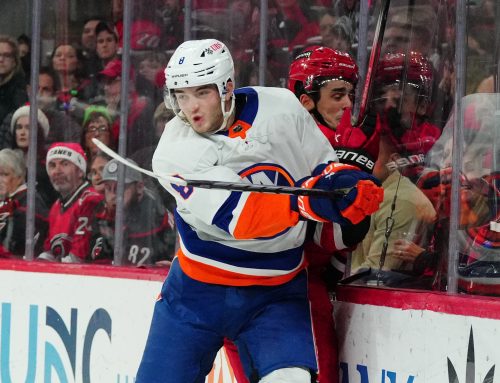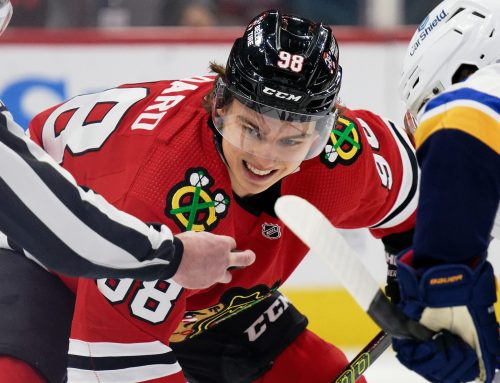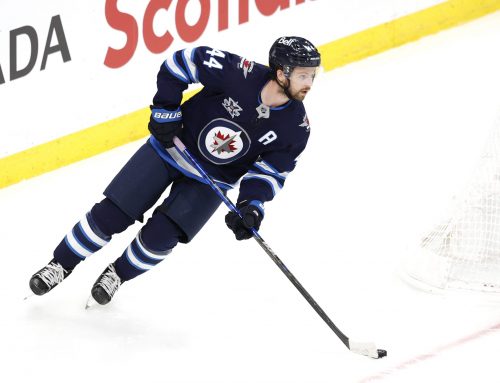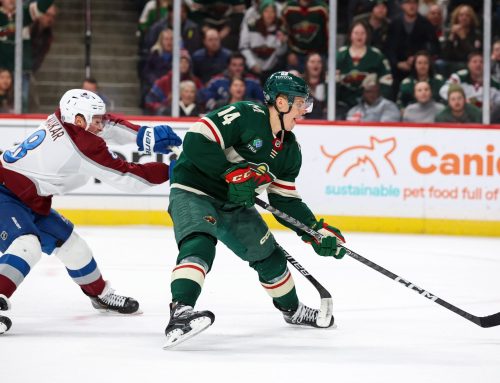Cage Match: Jason Zucker vs. Vincent Trocheck
Rick Roos
2015-11-25

The better fantasy own – Zucker or Trocheck? Five reasons why you should prefer one over the other…
A great thing about this time of year is I can find myself covering two players I wouldn’t have envisioned appearing in the column. Case in point are Jason Zucker and Vincent Trocheck, who likely weren’t even drafted in most fantasy leagues yet stood among the top 50 scoring forwards for nearly all of the first 20% of the season.
Can either player sustain – or even improve upon – his current pace, or are both in danger of seeing their totals come back to earth? Let’s find out – Cage Match starts now!
Career Path and Contract Status
Zucker, now 23, was drafted 59th in 2010. He posted two point-per-game campaigns at University of Denver before turning pro and making a six game cameo for the Wild in 2012. He landed in the AHL in 2012-13 during the lockout, producing 50 points in 55 games, then managed a meager five points in 20 games in Minnesota. In early 2014, Zucker seemingly landed in Minnesota to stay, only to suffer a season-ending injury and finish with totals (six points in 20 games) similar to 2012-13. Last season Zucker was enjoying a strong season but got hurt again, finishing with 26 points in 51 games, including 21 goals (15th best goals per game rate among all NHLers who appeared in 50+ contests).
Trocheck, now 22, was drafted a year later in a similar spot (64th overall). His production rate increased in each of his OHL campaigns, culminating in 109 points in 2012-13 to lead the league in scoring. After posting 42 points in 55 AHL contests but a goose egg in six World Championship games with Team USA, Trocheck landed in the NHL, where he –much like Zucker – didn’t make an immediate impact (eight points in 20 games). But also similar to Zucker, once Trocheck had a chance to play the majority of a season in the NHL, he fared better (22 points in 50 games).
According to Cap Friendly, both players are on the last season of deals that will leave them as RFAs this summer. Zucker is finishing his second contract, counting $0.900M yearly against the cap, while Trocheck is on the final year of his ELC counting $0.661M against the cap. Since his next deal will be his third, it stands to reason that Zucker will make considerably more in 2016-17 than Trocheck.
Ice Time
Note that all 2015-16 data in this and the other tables is current through Sunday November 22nd.
|
Season |
Total Ice Time per game (rank among team’s forwards) |
PP Ice Time per game (rank among team’s forwards) |
SH Ice Time per game (rank among team’s forwards) |
|
2015-16 |
18:29 (J.Z.) – 3rd (tied) 16:15 (V.T.) – 7th |
2:30 (J.Z.) – 6th 2:30(V.T.) – 6th |
0:37 (J.Z.) – 7th 0:18 (V.T.) – 8th |
|
2014-15 |
15:03 (J.Z.) – 7th 14:00 (V.T.) – 12th |
0:50 (J.Z.) – 9th 0:54 (V.T.) – 11th |
1:07 (J.Z.) – 7th 0:06 (V.T.) – 11th |
|
2013-14 |
12:59 (J.Z.) – 11th 18:53 (V.T.) – 1st |
0:49 (J.Z.) – 10th 2:33 (V.T.) – 3rd |
0:07 (J.Z.) – 12th 2:16 (V.T.) – 2nd |
|
2012-13 |
11:15 (J.Z.) – 12th |
0:19 (J.Z.) – 11th |
0:00 (J.Z.) |
The biggest surprise is Trocheck in 2013-14, when he was given Ice Time befitting a seasoned veteran. The likely goal was for the Panthers to see what they had in Trocheck; so when he only produced eight points in 20 games, it explains why his Ice Time was down considerably for 2014-15. But this season he made the most of the time he received while Aleksander Barkov went down with injury, especially on the PP, where he should be able to retain a spot even if he slips out of the top six from time to time.
Meanwhile, Zucker’s increasing production is in harmony with his Ice Time, with both having risen with each passing season. Of course that can’t continue forever, but it shows he’s deserving of the added Ice Time and, more importantly for poolies, makes it less likely his Ice Time will be dialed back even if he slumps somewhat or even after Zach Parise fairly imminent return from injury.
Secondary Categories
|
Season |
PIMs (per game) |
Hits (per game) |
Blocked Shots (per game) |
Shots (per game) |
PP Points (per game) |
|
2015-16 |
0.42 (J.Z.) 0.20 (V.T.) |
1.16 (J.Z.) 1.40 (V.T.) |
0.39 (J.Z.) 0.60 V.T.) |
3.15 (J.Z.) 1.75 (V.T.) |
0.11 (J.Z.) 0.30 (V.T.) |
|
2014-15 |
0.35 (J.Z.) 0.48 (V.T.) |
1.31 (J.Z.) 1.86 (V.T.) |
0.25 (J.Z.) 0.38 (V.T.) |
2.43 (J.Z.) 1.78 (V.T.) |
0.02 (J.Z.) 0.02 (V.T.) |
|
2013-14 |
0.09 (J.Z.) 0.30 (V.T.) |
0.76 (J.Z.) 1.95 (V.T.) |
0.52 (J.Z.) 0.55 (V.T.) |
1.90 (J.Z.) 1.90 (V.T.) |
0.09 (J.Z.) 0.05 (V.T.) |
|
2012-13 |
0.40 (J.Z.) |
0.55 (J.Z.)
📢 advertisement:
|
0.25 (J.Z.) |
1.70 (J.Z.) |
0.00 (J.Z.) |
When four seasons worth of data represents essentially 100 games for each player, the results will be at least somewhat inconsistent, especially in the area of PPP, as both players have only seen irregular PP shifts before this season. What we’re seeing for 2015-16 is Trocheck has done a lot to secure a regular spot in the PP rotation, while Zucker is faring okay but not great, and thus might not find his role there expanding and could even see less time if his production continues to lag or upon Parise’s return.
For Blocked Shots and PIM, both players are okay. Zucker’s Hits had been rising, suggesting his small decline for 2015-16 might be short term variance. Either way, he most likely can be counted upon for 1+ per game at this point. And although that’s still less than what Trocheck provides, the gap between them is shrinking, with Trocheck perhaps ending up as less of a Hits producer than might’ve been envisioned based on his previous seasons.
SOG is very key. Zucker has been on an upward trajectory, with his SOG/game for 2015-16 ranking him within the top 25 among NHL forwards. That bodes well for him continuing to remain a focal point of the offense, and to produce. Trocheck’s SOG totals have dropped year to year and his current rate is lower than all but roughly 10% of the top 50 NHL scorers, which in turn makes a case against him being able to sustain his level of production. But if you look at this with a glass half full mentality, it also gives him room to realistically see his scoring improve were he to fire the puck on the net more.
Luck-Based Metrics
Where “N/A” appears for 5×4 or 5×5 IPP, it’s because the player did not meet the 50+ minute minimum ice time requirement.
|
Season |
Personal Shooting Percentage |
PDO/SPSV (5×5) |
IPP (5×5) |
IPP (5×4) |
Offensive Zone Starting % (5×5) |
|
2015-16 |
10.0% (J.Z.) 20.0% (V.T.) |
1042 (J.Z.) 1000 (V.T.) |
62.5% (J.Z.) 87.5% (V.T.) |
N/A (J.Z.) N/A (V.T.) |
51.5% (J.Z.) 57.0% (V.T.) |
|
2014-15 |
16.9% (J.Z.) 7.9% (V.T.) |
963 (J.Z.) 1020 (V.T.) |
78.6% (J.Z.) 67.7% (V.T.) |
N/A (J.Z.) N/A (V.T.) |
54.3% (J.Z.) 55.5% (V.T.) |
|
2013-13 |
10.0% (J.Z.) 13.2% (V.T.) |
1029 (J.Z.) 915 (V.T.) |
37.5% (J.Z.) 83.3% (V.T.) |
N/A (J.Z.) 25.0% (V.T.) |
57.7% (J.Z.) 51.4% (V.T.) |
|
2012-13 |
11.8% (J.Z.) |
1039 (J.Z.) |
50.0% (J.Z.) |
N/A (J.Z.) |
41.7% (J.Z.) |
Zucker’s Shooting % was high last season, yet his PDO/SPSV was quite low, balancing good luck with bad. That, plus realistic 5×5 IPP and OZ% numbers made his output for 2014-15 reasonable. And although his PDO/SPSV is running high this season, yet again his good luck is canceled out, this time by a lower 5×5 IPP and a slightly lower OZ%. The big picture suggests that Zucker could sustain his current scoring pace if he continues to receive similar Ice Time.
Trocheck’s 5×5 IPP for 2015-16 would be alarming, if it didn’t mirror what he did in 2013-14. When a young player is able to post a very high 5×5 IPP more than once, it suggests he drives offense and has the capability of being an elite scorer. Of course that’s if everything else also falls into place, and here it’s based on two sample sizes of roughly 20 games played, so it must be taken with a grain of salt. Plus, Trocheck’s Shooting % for this season is quite high, although on the flip side it being so low last season explains why his production there wasn’t somewhat better.
Overall, Trocheck’s situation is less clear than Zucker’s, supporting the idea that Zucker could be a safer bet but also might lack Trocheck’s breakout potential.
Other Factors
Both are RW eligible on Yahoo, with Trocheck adding center eligibility as well, versus Zucker at LW. This allows Trocheck to provide FOW from the RW position, although he’s averaging only about four per game this season. Beyond that, Zucker also has missed chunks of time in each of the past two seasons due to injury, to the point where whispers of him being on his way to band-aid boy status are justified.
Zucker has meshed well with Mikko Koivu, helping reignite Koivu in the process. But Koivu’s production should decline soon. Will that mean he brings down Zucker along the way? Also, although Minnesota sometimes plays four forward son its PP1 unit, with Zucker manning one of the points, that’s tough to bank on continuing, and it’s hard to envision Zucker elbowing a Wild big gun off PP1.
Trocheck’s versatility has meant bouncing in and out of the Panthers top six. He’s also not on what’s technically Florida’s PP1, which on one hand is positive since he’s been able to be productive with the man advantage despite that, yet also concerning since it might be harder for him to maintain his pace.
The winner is……..Jason Zucker
Matches like these are difficult because we’re talking about two players with so little NHL experience; but here are five reasons why Zucker wins this match:
1) Zucker’s story checks out more than Trocheck’s
Zucker’s Ice Time and production have been on the rise year-to-year. That’s the mark of a player who’s for real. Also, it means Minnesota would be less likely to drop his Ice Time in the future, unless Zucker does indeed become a full-fledged band-aid boy. Trocheck has done well also, but much of that was while Barkov was injured. And although Trocheck might have the pedigree to become an elite scorer, it’s not clear all the dots needed for that to happen will connect any time soon, if at all.
2) Zucker is about to sign his third NHL contract, versus Trocheck’s second
Starting next season, Zucker will make not only well more than he does now, but also most likely a lot more than Trocheck, who’ll only be embarking on his second deal. Although this might make Trocheck more alluring for poolies in cap leagues, it also will render him more vulnerable than Zucker to being placed in the bottom six.
3) Zucker’s SOG are elite
High SOG totals don’t correlate 100% with top production, just like lower SOG totals don’t necessarily mean a player cannot produce. But the reality is players – like Zucker – who shoot a lot are more likely to score more than players – like Trocheck – who don’t. Plus, there’s the multi-cat benefit.
4) Florida could sign high priced talent to further jeopardize Trocheck’s spot
According to Cap Friendly, Florida will have $32M of cap space next season, versus $12M for the Wild. This means Florida will obtain more high priced talent, who in turn could freeze Trocheck entirely out of the Florida top six. Meanwhile, the Wild likely will make due with essentially what they have now, in which case Zucker’s top six spot should be safer.
5) Trocheck’s scoring prowess in junior is an albatross
When a player, like Trocheck, is such a success in junior, it can haunt him in his career if he doesn’t meet expectations based on past scoring prowess. In this case, it could make Trocheck be seen as somewhat of a disappointment, and in turn hurt his confidence and/or his place on the team.





 MTL
MTL T.B
T.B TOR
TOR COL
COL CAR
CAR VAN
VAN VGK
VGK EDM
EDM NYR
NYR
